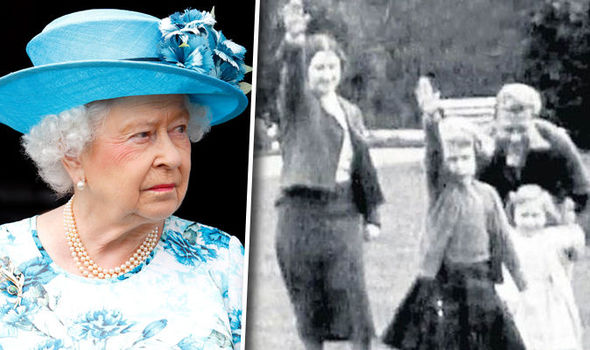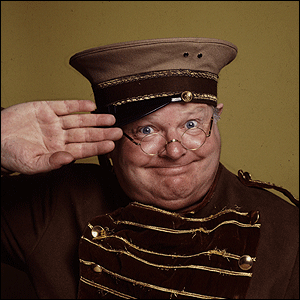It looks like you're using an Ad Blocker.
Please white-list or disable AboveTopSecret.com in your ad-blocking tool.
Thank you.
Some features of ATS will be disabled while you continue to use an ad-blocker.
share:
An interesting article came out in Entertainment Weekly this past week that features an interview with Jan Harlan (cousin to Kubrick's widow, and
producer for The Shining) and Diane Johnson (who co-wrote the screenplay with Kubrick).
I'm putting this in General Conspiracies because it pertains to some long running theories about why Kubrick decided to deviate from Stephen King's novel, and in doing so, this article addresses a few other conspiracy theories related to The Shining that cropped up after his death.
The Shining Producer Explains Ending Changes
Spoiler Alert!
In the novel, Jack manages to overcome the haunting influence of the Overlook hotel just long enough for Danny and Wendy to escape, then burns to death in the fire that destroys the hotel.
In the film, Jack chases Danny & Wendy into the maze, gets lost, and freezes to death. Then we see the infamous mind# photo where Jack is in attendance at a party in the Gold Room of the Overlook hotel, except that the photo was taken in the 1920s.
Anyways...
So apparently Jan & Diane are just now deciding to go public about some of the considerations that were made by Kubrick that were later rejected.
What's even more interesting and relevant to this thread is that one of these earlier drafts by Kubrick & Johnson has leaked online and can now be downloaded.
One of the more conspiracy related subjects discussed was the infamous photo revealed in the end of the film that shows Jack at the Overlook in 1921:
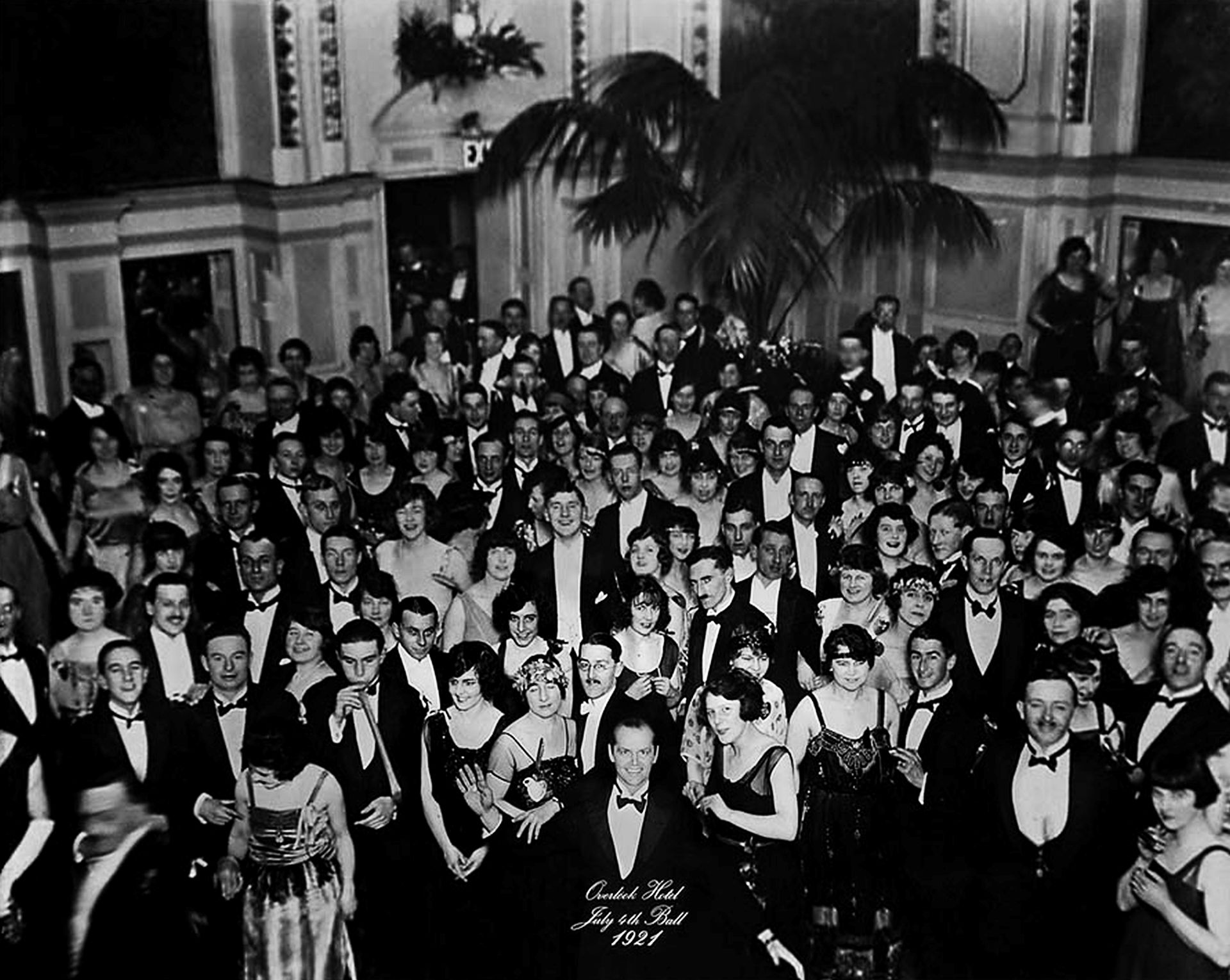
Fun fact, that was a real photo from the 1920s. Kubrick had Jack Nicholson's face cut/paste and airbrushed into the original.
Then Jan Harlan speaks about some of the conspiracy theories mentioned in Room 237:
Anyways, I can't post the entire interview here and there are a lot of fun and interesting gems in there. I strongly suggest that everyone read the full interview in the source link at the top of my OP.
But before I conclude this thread, here the pages of the screenplay that include a deleted scene from the ending where the original hotel manager from the beginning goes to visit Wendy & Danny at the hospital. Keep in mind that this was to be shown after Jack freezes to death, but before we see the final photograph of Jack.
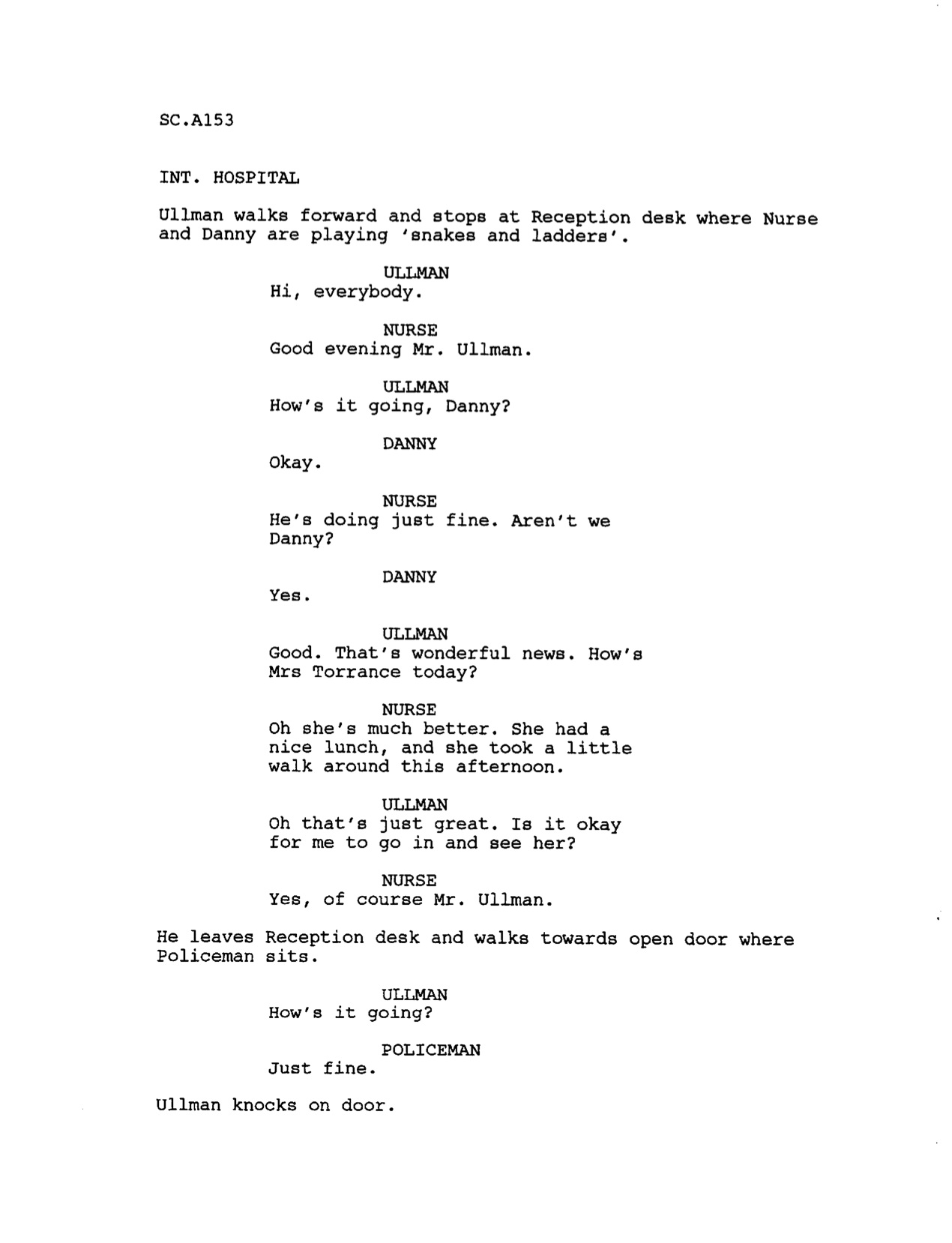
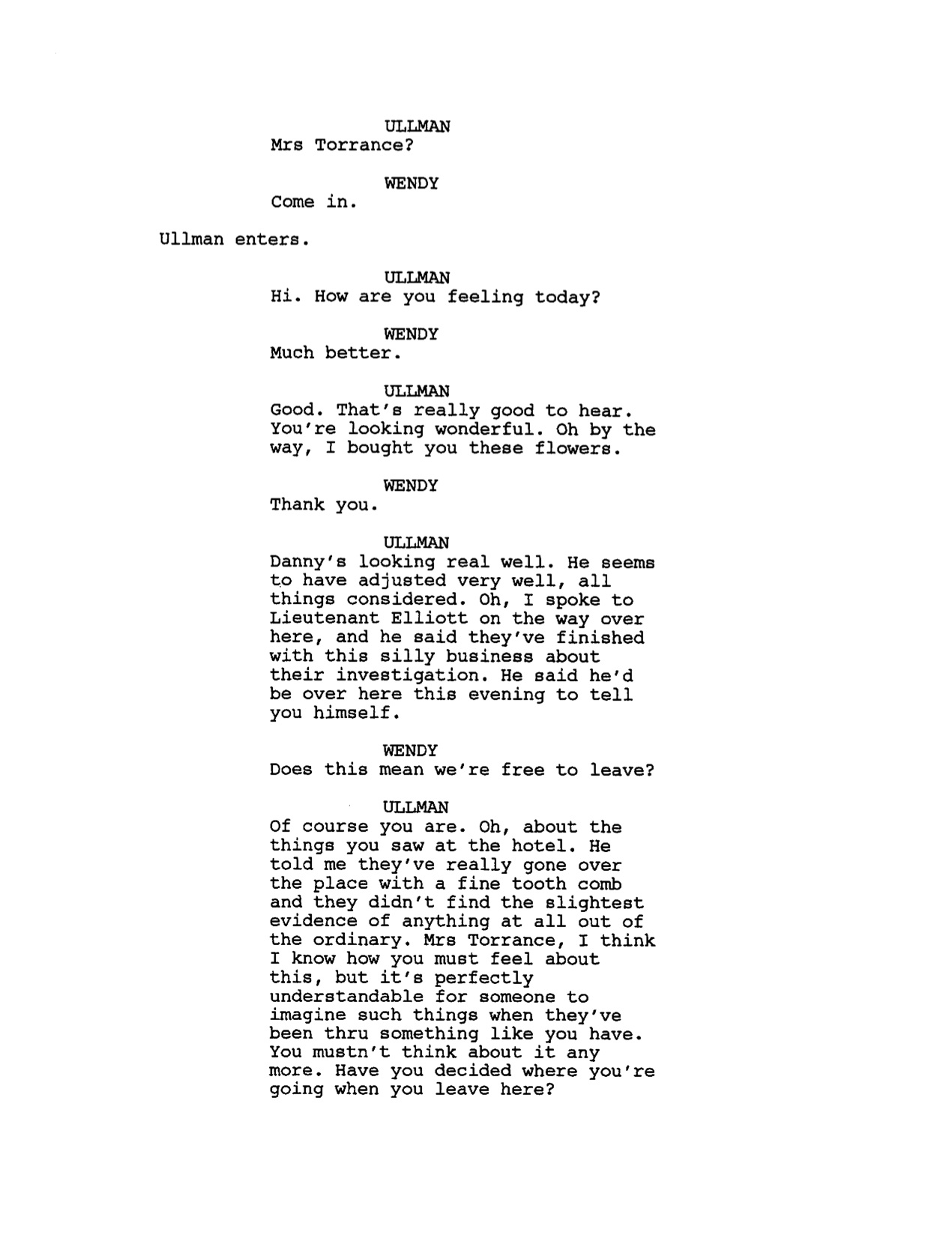
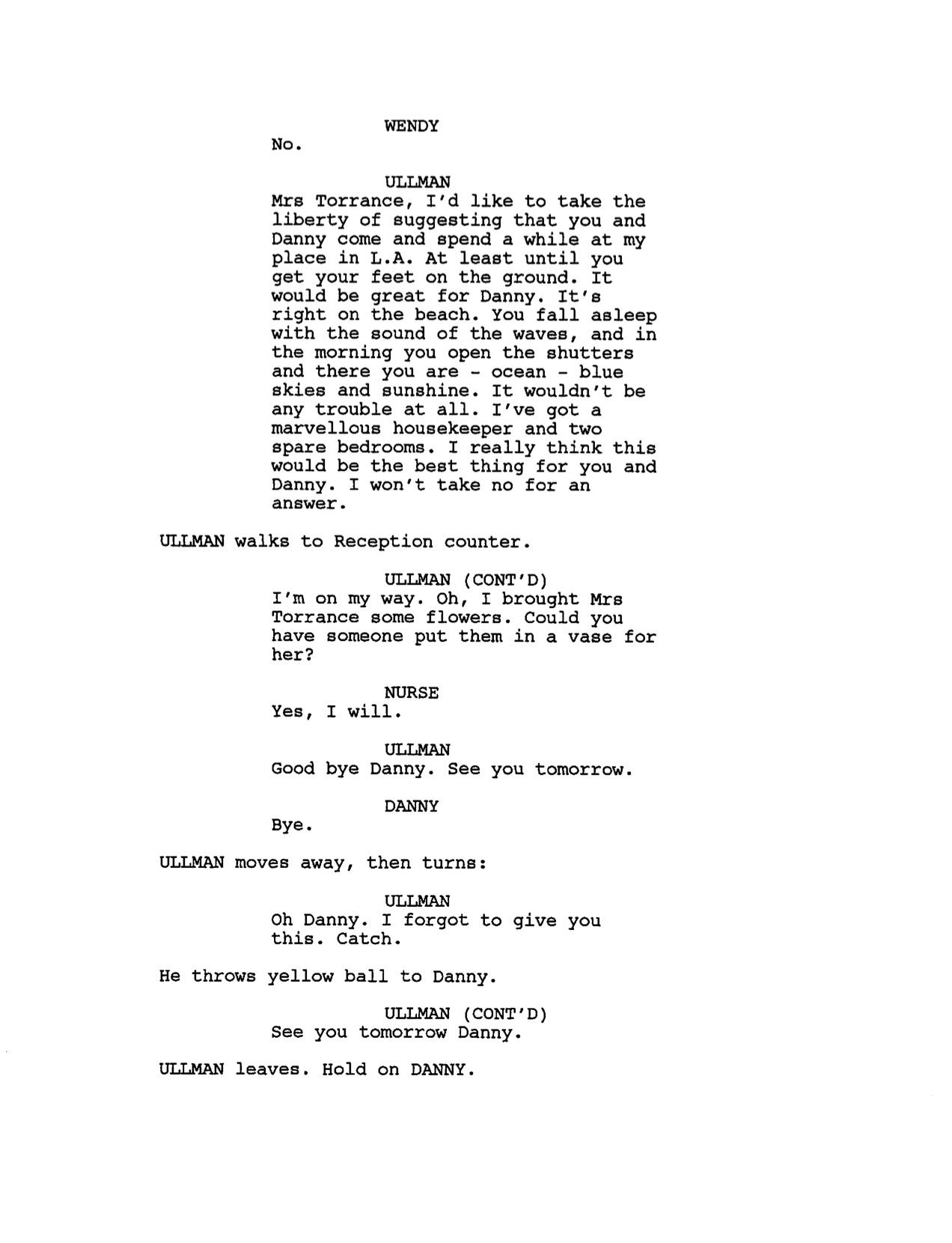
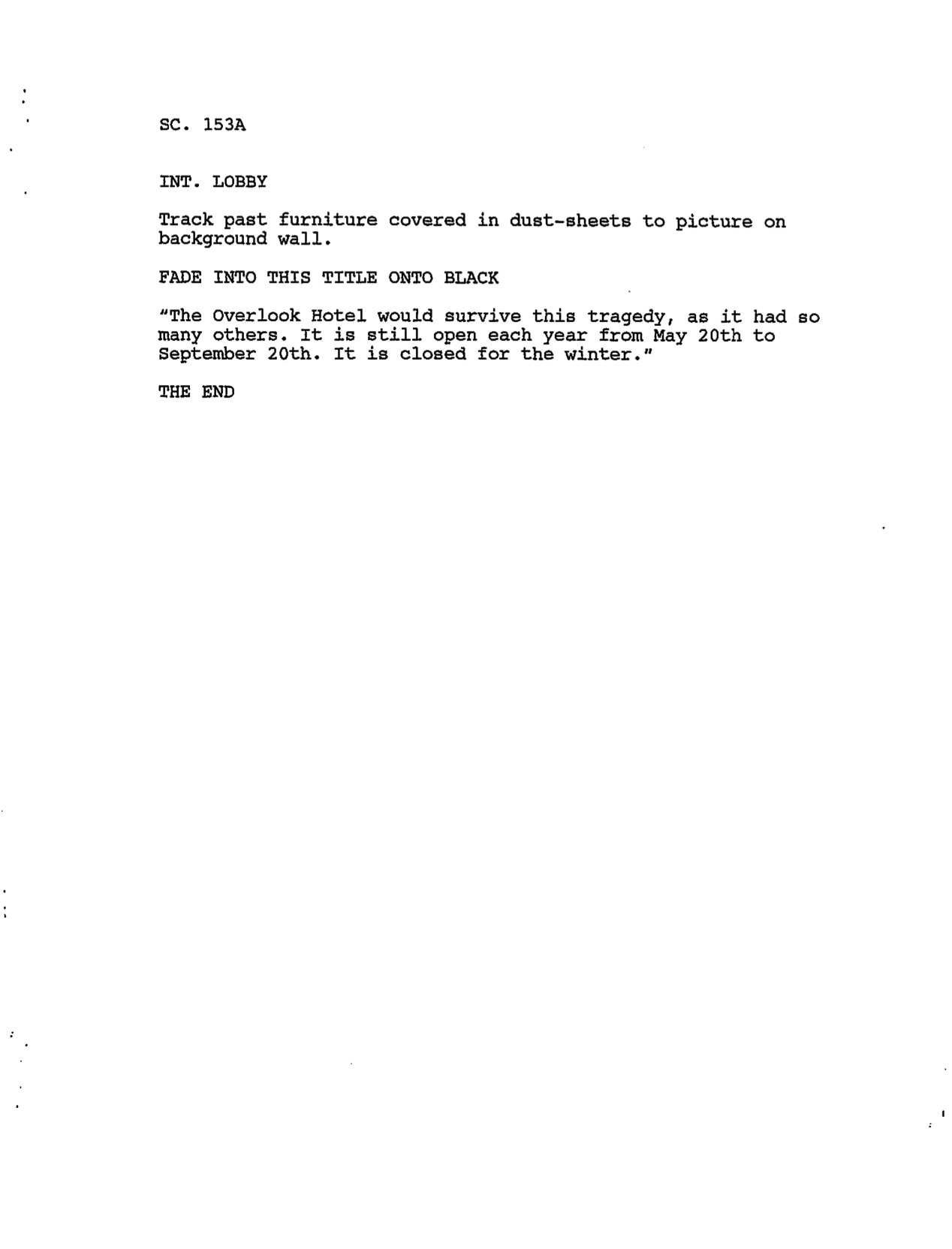
Don't worry yourself about whether this deleted scene will ever surface to be seen again - it won't. Kubrick had ordered Warner Brothers to systematically destroy all deleted scenes in order to prevent anyone from ever releasing a different cut after his death. I can't remember any other director in modern history that had this much control over a major studio.
I'm putting this in General Conspiracies because it pertains to some long running theories about why Kubrick decided to deviate from Stephen King's novel, and in doing so, this article addresses a few other conspiracy theories related to The Shining that cropped up after his death.
The Shining Producer Explains Ending Changes
The Shining is a horror cinema masterpiece, and figuring out its haunting and iconic ending was no easy task for Stanley Kubrick. Below, executive producer Jan Harlan and screenwriter Diane Johnson (who wrote the script with Kubrick) explain in greater detail than ever before how the legendary director considered several very different conclusions for the iconic 1980 film.
Kubrick’s starting point was, of course, Stephen King’s bestselling novel. The director dismissed King’s ending in an early treatment for the film, then changed the final act again for the shooting script, and still again for the movie’s first cut. The meticulous filmmaker didn’t settle on the version we know today until the last possible moment. Heeeeere’s what happened:
Jan Harlan: Stanley was fundamentally not interested in a horror film. He doesn’t believe in ghosts. When the book was offered to him by Warner Bros., he said, “Well, all right, it might be challenging to do this, but I must have the freedom to change whatever I like.” Stephen King was perfectly happy with that [at the time], it’s obviously a prerequisite to making a film. And Stanley certainly changed it drastically…
Spoiler Alert!
In the novel, Jack manages to overcome the haunting influence of the Overlook hotel just long enough for Danny and Wendy to escape, then burns to death in the fire that destroys the hotel.
In the film, Jack chases Danny & Wendy into the maze, gets lost, and freezes to death. Then we see the infamous mind# photo where Jack is in attendance at a party in the Gold Room of the Overlook hotel, except that the photo was taken in the 1920s.
Anyways...
Diane Johnson: The ending was changed almost entirely because Kubrick found it a cliche to just blow everything up. He thought there might be something else that would be metaphorically and visually more interesting … The talkiness [of the book] was also discussed. A lot of the script was pared down during filming, too — especially for Wendy, who had many more things to say in the script than she did in the film.
So apparently Jan & Diane are just now deciding to go public about some of the considerations that were made by Kubrick that were later rejected.
What's even more interesting and relevant to this thread is that one of these earlier drafts by Kubrick & Johnson has leaked online and can now be downloaded.
Johnson: In the book, nobody gets killed except Jack. And Kubrick really thought somebody should get killed — because it was a horror movie. So we weighed the dramatic possibilities of killing off various characters and did different treatments. We actually talked it over in detail the possibility of having different people getting killed.
Even Danny, at one point, was briefly considered for the ending’s tragic victim…
Johnson: Danny’s relationship with his father was the thing that most interested Kubrick. He was emotionally involved with the point of view of a little boy who is afraid of his father. I remember Kubrick saying that visually he could imagine a small yellow chalk outline on the floor like that they put around the bodies of victims. And Kubrick liked that image. But he was too tender-hearted for that ending and thought it would be too terrible to do …
One of the more conspiracy related subjects discussed was the infamous photo revealed in the end of the film that shows Jack at the Overlook in 1921:

Johnson: The photograph was always in the ending. The maze chase grew out of the topiary animal hedges that move around in the book. Kubrick thought topiary animals might be too goofy and cute, but he always liked the idea of a maze … [For Hallorann’s death] Kubrick didn’t want it to be too gory, he thought a lot of blood was vulgar. He wanted it to be mostly psychological. Of course, there’s the image of the blood coming out of the elevators, but that was more ornamental and metaphorical — it’s different than seeing people get stabbed. The elevator opening was an image he had in mind all along and had even prepared it by the time we were writing. So there was some discussion about trying to find a way of ending it without a lot of blood.
Fun fact, that was a real photo from the 1920s. Kubrick had Jack Nicholson's face cut/paste and airbrushed into the original.
Then Jan Harlan speaks about some of the conspiracy theories mentioned in Room 237:
Harlan: Very often crew members asked him, “Can you explain that to me?” And he said, “I never explain anything, I don’t understand it myself. It’s a ghost film!” You can’t imagine how much fuss was made over the big golden ballroom and the big lobby and huge windows that could never have fit into the hotel [based on the] establishing shot from outside. Any child can see that. And Stanley’s explanation was, “It’s a ghost film! Forget it!” … It’s not a movie with a serious message. I know many people think its impossible that Kubrick did a film which didn’t have serious messages and an enormous amount of [theories have been] invented. While he was alive all that was relatively quiet. After his death, these [theories] came out which were funny, and partly insulting. The most insulting one is the idea that The Shining is a film about the Holocaust. That’s outrageous. That’s an insult to Kubrick, that he would deal with the most serious crime in human history in such a light way, and also an insult to victims of the Holocaust. The other ideas are much more harmless, where continuity mistakes are attributed with deep meaning.
Anyways, I can't post the entire interview here and there are a lot of fun and interesting gems in there. I strongly suggest that everyone read the full interview in the source link at the top of my OP.
But before I conclude this thread, here the pages of the screenplay that include a deleted scene from the ending where the original hotel manager from the beginning goes to visit Wendy & Danny at the hospital. Keep in mind that this was to be shown after Jack freezes to death, but before we see the final photograph of Jack.




Don't worry yourself about whether this deleted scene will ever surface to be seen again - it won't. Kubrick had ordered Warner Brothers to systematically destroy all deleted scenes in order to prevent anyone from ever releasing a different cut after his death. I can't remember any other director in modern history that had this much control over a major studio.
a reply to: ColdWisdom
Kubrick was a very gifted film maker indeed.
"The Shining" is a very scary movie. I watch horror movies all the time and "The Shining" is one of the most scary because it is something that has happened to people and really could happen; the dad losing his marbles and becoming violently psychotic. I like the movie "The Witch" for the same reasons; alienated family in the wilderness falling to bits (obviously not on the scale of Kubrick's talent, but a good movie).
Jack Nicholson is one hell of a talent. He is crazily gifted. It is art that you wish would never have to end, one of those.
Thanks for this extra info about the making of the film. I think Kubrick did right by denying them any messing potential with his legacy. He is the artist. It is his genius. If they tried to do better they would only mock him; that would be profane.
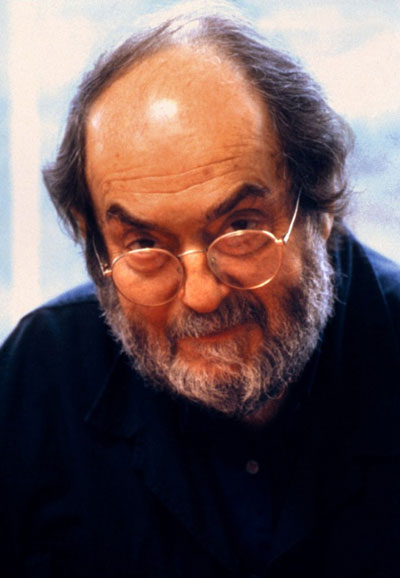
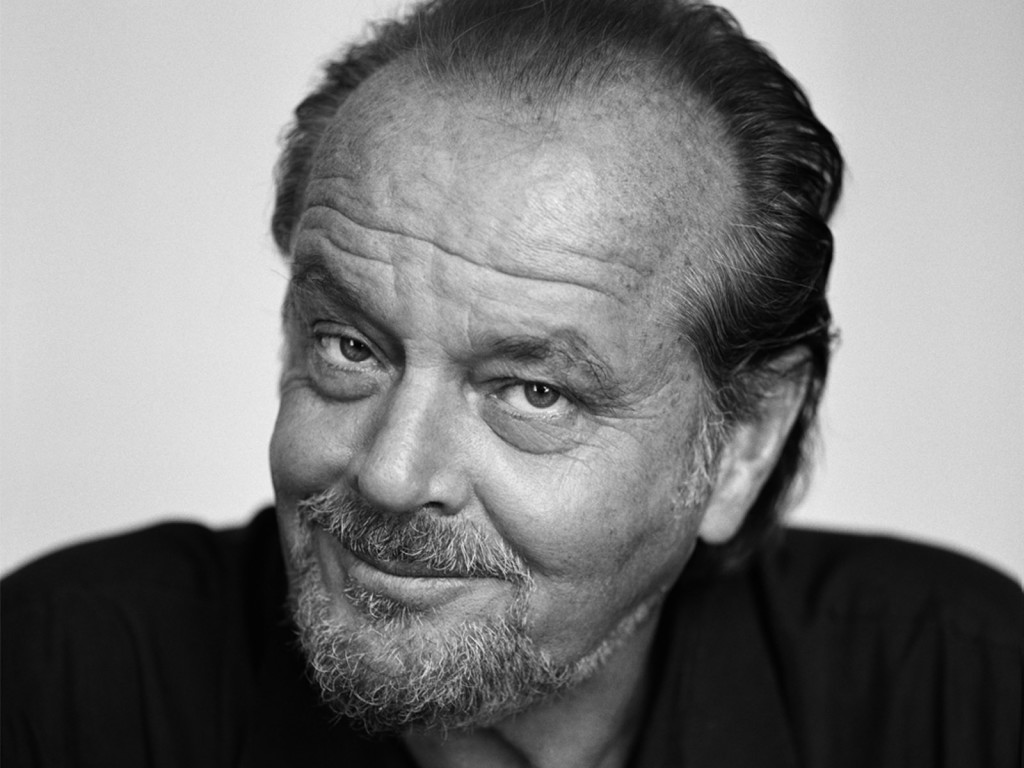
Kubrick was a very gifted film maker indeed.
"The Shining" is a very scary movie. I watch horror movies all the time and "The Shining" is one of the most scary because it is something that has happened to people and really could happen; the dad losing his marbles and becoming violently psychotic. I like the movie "The Witch" for the same reasons; alienated family in the wilderness falling to bits (obviously not on the scale of Kubrick's talent, but a good movie).
Jack Nicholson is one hell of a talent. He is crazily gifted. It is art that you wish would never have to end, one of those.
Thanks for this extra info about the making of the film. I think Kubrick did right by denying them any messing potential with his legacy. He is the artist. It is his genius. If they tried to do better they would only mock him; that would be profane.


edit on 6-4-2017 by Revolution9 because: (no reason given)
Kubrick was a trip.
A great trip...but he wanted things done the way he wanted them done.
MFIC.
Translating a novel into a movie is quite a chore.
I say he hit the nail right on the head.
A great trip...but he wanted things done the way he wanted them done.
MFIC.
Translating a novel into a movie is quite a chore.
I say he hit the nail right on the head.
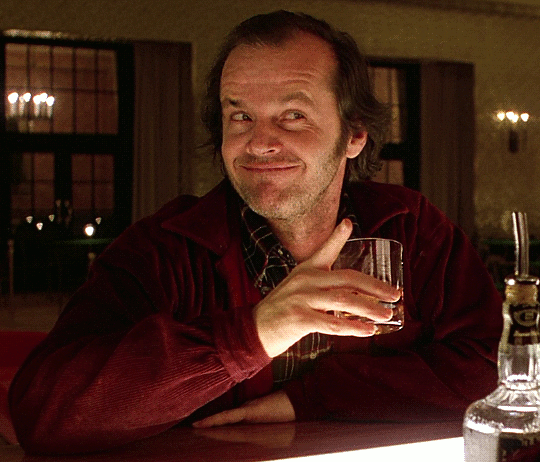
It takes a mad genius to put King's novels to film and make them watchable.
This has always been one of my favorite films. It's just timeless. I even tried to visit the hotel, but jeez, screw Estes Park Colorado. It's a literal tourist trap with 25,000 people crammed into a space that could barely accommodate 2500.
This is some good reading OP.
Thanks.
a reply to: Revolution9
The scariest movie growing up for me was The Exorcist. That movie flat out traumatized me at age 10!
Fun fact, Kubrick actually screened The Exorcist on set to the actors in order to convey the 'mood' or 'tone' he wanted to achieve in The Shining.
Also screened on set were Eraserhead and Rosemary's Baby.
Fun fact, while Kubrick was filming The Shining at Elstree Studios in the UK, David Lynch was filming The Elephant man, also in the UK.
Kubrick found out David Lynch was in town and decided to invite him over to dinner at his home in Hertfordshire. According to Lynch, after dinner Kubrick told Lynch that he wanted to show him his favorite movie. Being the huge fan of Kubrick himself, Lynch was forced to oblige. Kubrick took Lynch into his home's private theater and put on, you guessed it, Eraserhead. Lynch said he could have died right there! This was all in Lynch's book Catching The Big Fish from back in 08.
Kubrick did mention on one or more occasions that Eraserhead was one of his all time favorite films.
The scariest movie growing up for me was The Exorcist. That movie flat out traumatized me at age 10!
Fun fact, Kubrick actually screened The Exorcist on set to the actors in order to convey the 'mood' or 'tone' he wanted to achieve in The Shining.
Also screened on set were Eraserhead and Rosemary's Baby.
Fun fact, while Kubrick was filming The Shining at Elstree Studios in the UK, David Lynch was filming The Elephant man, also in the UK.
Kubrick found out David Lynch was in town and decided to invite him over to dinner at his home in Hertfordshire. According to Lynch, after dinner Kubrick told Lynch that he wanted to show him his favorite movie. Being the huge fan of Kubrick himself, Lynch was forced to oblige. Kubrick took Lynch into his home's private theater and put on, you guessed it, Eraserhead. Lynch said he could have died right there! This was all in Lynch's book Catching The Big Fish from back in 08.
Kubrick did mention on one or more occasions that Eraserhead was one of his all time favorite films.
a reply to: ColdWisdom
Yes, The Exorcist is a very scary movie:
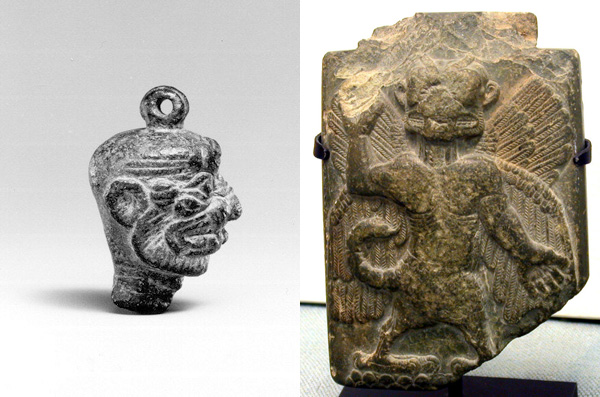
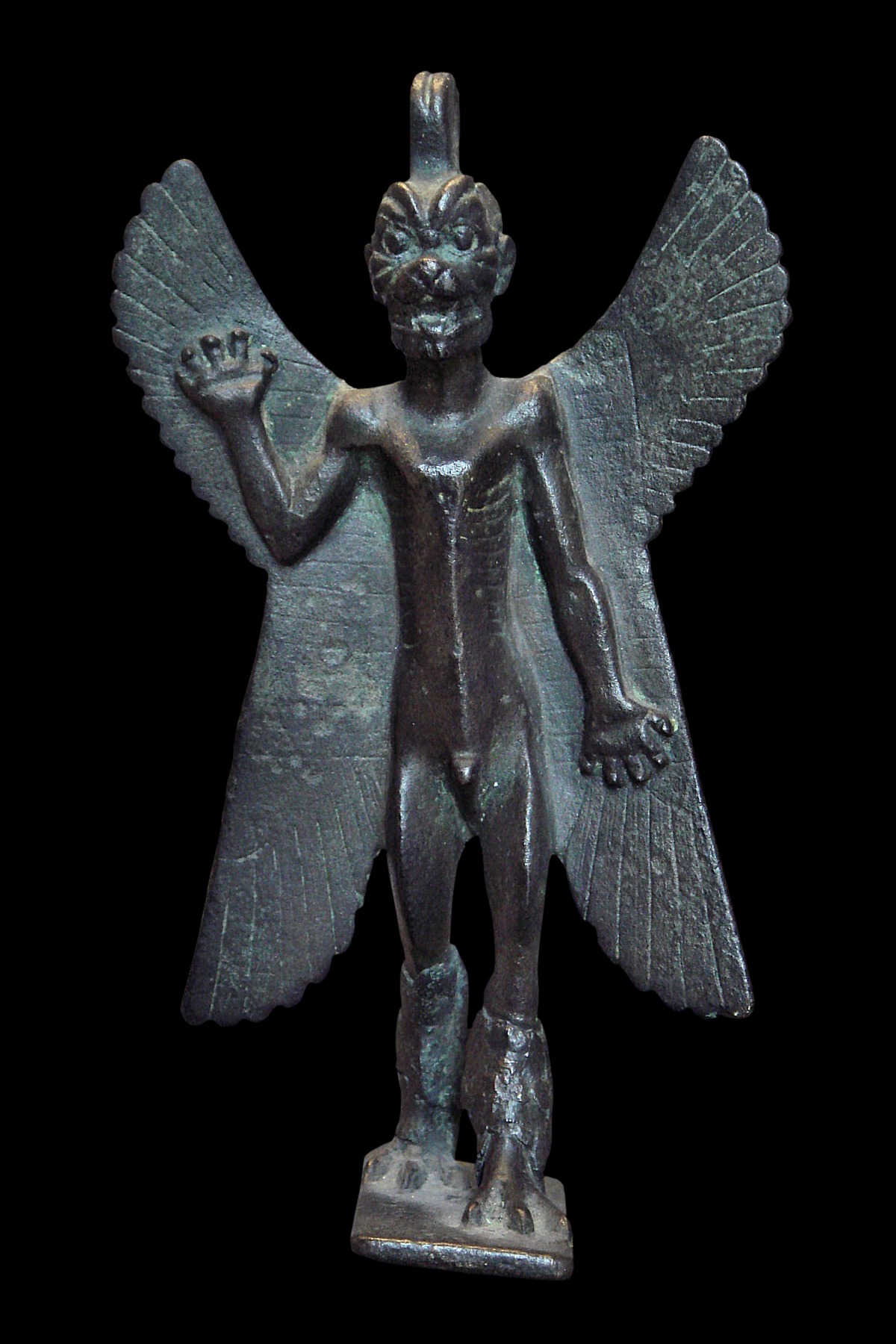
His arms are positioned like Baphomet AND George Washington. lol. Do you think the George Washington and/or Baphomet postures deliberately emulate the old Babylonian King of Demons Pazuzu?
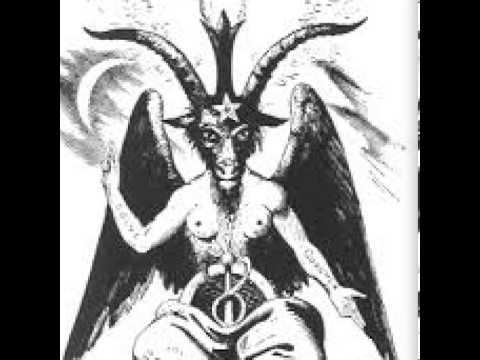
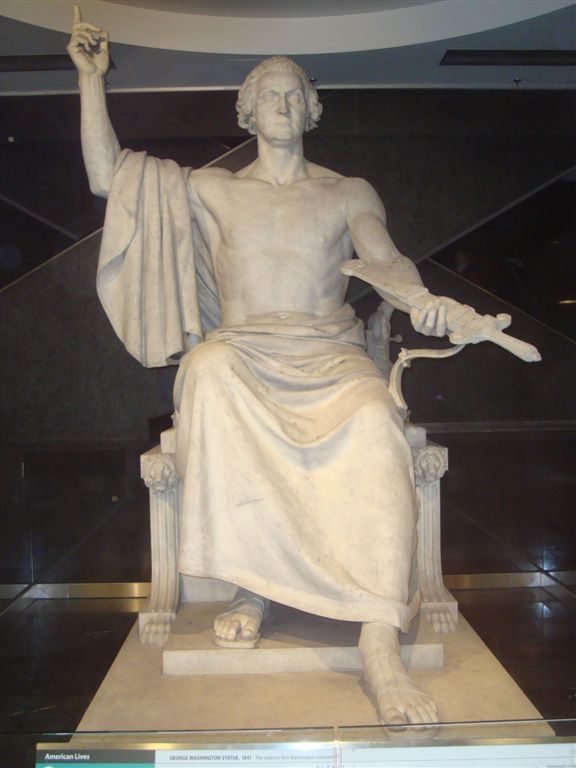
Pazuzu (Wikipedia)
I think the GW statue is very peculiar. It is in the style of the Roman Emperors, who believed themselves to be gods. Seems unusual for egalitarian America. I wonder what that posture really means? It is very ancient indeed and must relate in some way to deities, priesthoods, kings and the likes.
Imagine in two thousand years; Washington will be as mythological and legendary as Romulus and his bro'.
Yes, The Exorcist is a very scary movie:
Blatty derived the character from Assyrian and Babylonian mythology, where Pazuzu was considered the king of the demons of the wind, and the son of the god Hanbi. In The Exorcist, Pazuzu appears as a demon who possesses Regan MacNeil.


His arms are positioned like Baphomet AND George Washington. lol. Do you think the George Washington and/or Baphomet postures deliberately emulate the old Babylonian King of Demons Pazuzu?


Pazuzu (Wikipedia)
I think the GW statue is very peculiar. It is in the style of the Roman Emperors, who believed themselves to be gods. Seems unusual for egalitarian America. I wonder what that posture really means? It is very ancient indeed and must relate in some way to deities, priesthoods, kings and the likes.
Imagine in two thousand years; Washington will be as mythological and legendary as Romulus and his bro'.
edit on 6-4-2017 by Revolution9 because: (no reason given)
a reply to: Revolution9
Baphomet, maybe.
But Washington?
Maybe.
As above.
So below.
His arms are positioned like Baphomet AND George Washington. lol. Do you think the George Washington and/or Baphomet postures deliberately emulate the old Babylonian King of Demons Pazuzu?
Baphomet, maybe.
But Washington?
Maybe.
As above.
So below.
edit on 4/6/2017 by ColdWisdom because: (no reason given)
a reply to: ColdWisdom
The pictures are telling it, not me.
Coincidence? Maybe, but I doubt it. Someone somewhere knows what it means.
The pictures are telling it, not me.
Coincidence? Maybe, but I doubt it. Someone somewhere knows what it means.
a reply to: Revolution9
I already told you what it means!
As above, so below.
Duh.
I'm sure AugustusMasonicus can at least tell us what Washington's pose means.
I already told you what it means!
As above, so below.
Duh.
I'm sure AugustusMasonicus can at least tell us what Washington's pose means.
a reply to: ColdWisdom
Yes, but that's not all. It is a deification of the human in Washington's case. It is a mighty posture for a President to assume. If a President did that now I would be as worried as a Hebrew faced with Nero's insanity of grandeur.
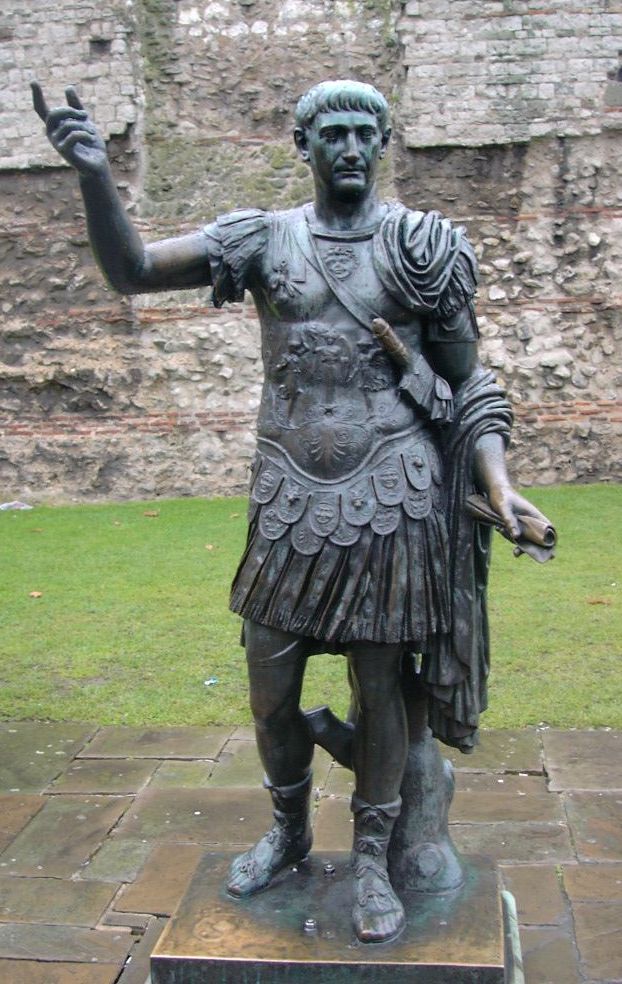
Trajan (very similar posture to Washington).
Look at all the statues of the Roman Emperors. Many of them have one arm raised.
No Egyptian Pharaohs used this posture.
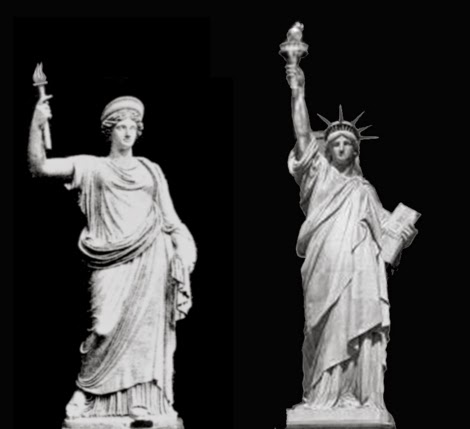
Statue of Liberty does it.
It seems to be a Roman thing and the only place I can see it in Assyrian culture is Pazuzu.
So, Roman Emperors had themselves portrayed in this posture, Pazuzu and Baphomet, George Washington and the Statue of Liberty the same.
Nowhere to be found in Greek culture or Egyptian culture; well only once in Neptune's case, but he is holding a fork and that really is just coincidence.
There is no doubt a linkage between ancient Rome and the U.S. That may be something as innocent as an acknowledgement of the Roman "SENATE", just like the U.S "SENATE". We don't have senators in the U.K. Only the U.S has those.
Interesting that the military salute is with one arm raised in some cultures. Particularly in Nazi Germany they went to extremes;
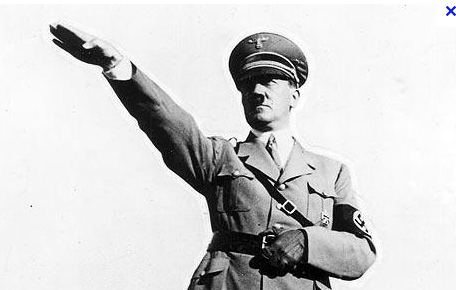
See what I mean about delusions of godly grandeur. I would never dare to assume a posture like that. I would fear being struck with the lightning of the gods for my vanity. Nor would I raise an arm to acknowledge any power of this earth.
Yes, but that's not all. It is a deification of the human in Washington's case. It is a mighty posture for a President to assume. If a President did that now I would be as worried as a Hebrew faced with Nero's insanity of grandeur.

Trajan (very similar posture to Washington).
Look at all the statues of the Roman Emperors. Many of them have one arm raised.
No Egyptian Pharaohs used this posture.

Statue of Liberty does it.
It seems to be a Roman thing and the only place I can see it in Assyrian culture is Pazuzu.
So, Roman Emperors had themselves portrayed in this posture, Pazuzu and Baphomet, George Washington and the Statue of Liberty the same.
Nowhere to be found in Greek culture or Egyptian culture; well only once in Neptune's case, but he is holding a fork and that really is just coincidence.
There is no doubt a linkage between ancient Rome and the U.S. That may be something as innocent as an acknowledgement of the Roman "SENATE", just like the U.S "SENATE". We don't have senators in the U.K. Only the U.S has those.
Interesting that the military salute is with one arm raised in some cultures. Particularly in Nazi Germany they went to extremes;

See what I mean about delusions of godly grandeur. I would never dare to assume a posture like that. I would fear being struck with the lightning of the gods for my vanity. Nor would I raise an arm to acknowledge any power of this earth.
edit on 6-4-2017 by Revolution9 because: (no reason given)
a reply to: Revolution9
I don't know dude.
I don't even know that Kubrick intended for that photo at the end of The Shining to be a reference to Baphomet. In fact, everything we know about it says that it wasn't.
Even if it wasn't, the fact that Kubrick's films contain enough unconscious symbolism to allow for many interpretations speaks volumes of Kubrick's understanding of Jungian archetypes in visual art and in psychology.
I don't know dude.
I don't even know that Kubrick intended for that photo at the end of The Shining to be a reference to Baphomet. In fact, everything we know about it says that it wasn't.
Even if it wasn't, the fact that Kubrick's films contain enough unconscious symbolism to allow for many interpretations speaks volumes of Kubrick's understanding of Jungian archetypes in visual art and in psychology.
edit on 4/6/2017 by ColdWisdom because: (no reason given)
a reply to: ColdWisdom
Big time. A lot of what we do is unconscious.
We make body gestures specific to our psychological state. People use posture to demonstrate authority (think how the male in so many species will puff himself up, etc).
We humans are no different. I think it is more a reference to pride, elevation on an unconscious (and perhaps sometimes conscious) level.
The Baphomet does keep cropping up though. Bob Dylan has used it a lot as symbolism. I know he is a Mason. Does it reflect back to the Ram's Horns of the Hebrews in part? A lot of Jewish and Masonic related stuff seems to be associated with it. What is it my fellows find so intresting about Baphomet? The Crusaders of the 11th century saw it as a foreign enemy's deity. Yet they brought it home and it became tied up with secret societies and the occult ever after.
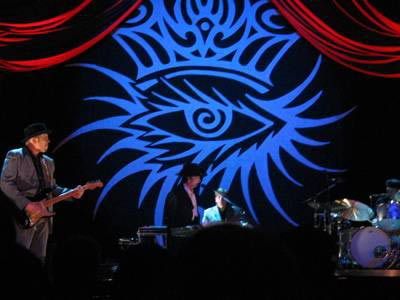
(Bob Dylan with his All Seeing Eye and Baphomet back drop)
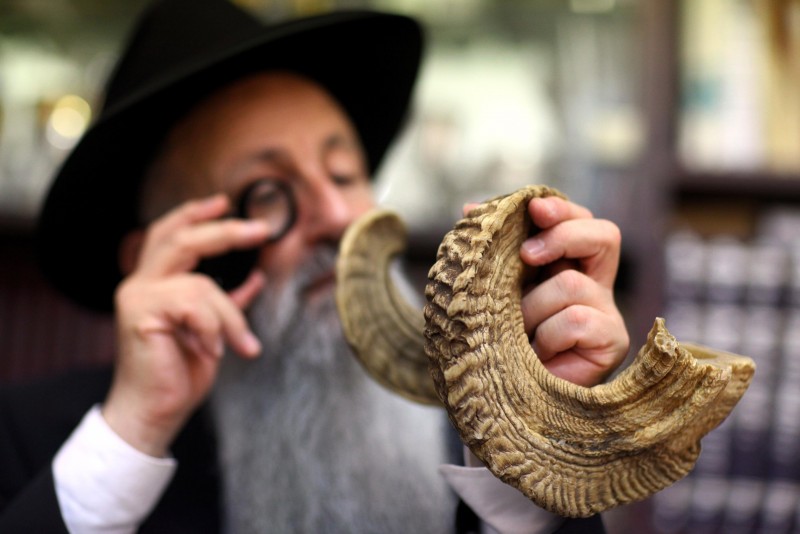
Baphomet (Wikipedia)
The Baphomet is no doubt Persian and probably as old as Pazuzu; it may even be a take on Pazuzu?
Or the crescent moon:
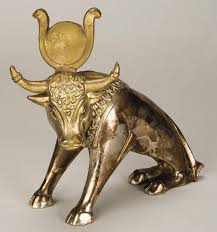
Remember SIN:
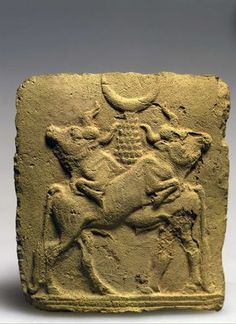
That's him in the middle of the bulls from ancient Babylon. Sin is the Moon god and the crescent Moon depicted like horns; that's one of the reasons why the bull and horns are venerated because of their resemblance (sympathy) with the crescent Moon. We even have the sacred cow to this day in India.
Sin started off in Assyria. Abraham came out of that culture. Even in Moses' time the Hebrews still had a great affection for Sin. Literally in The Wilderness of Sin they made the Golden Calf to worship. Remember Sinai comes from Sin. Our word for being naughty is "SIN". Sin was obviously still in vogue in Moses' time and beyond. Does Sin relate to Baphomet?
Every cowboy loves their bull horns:
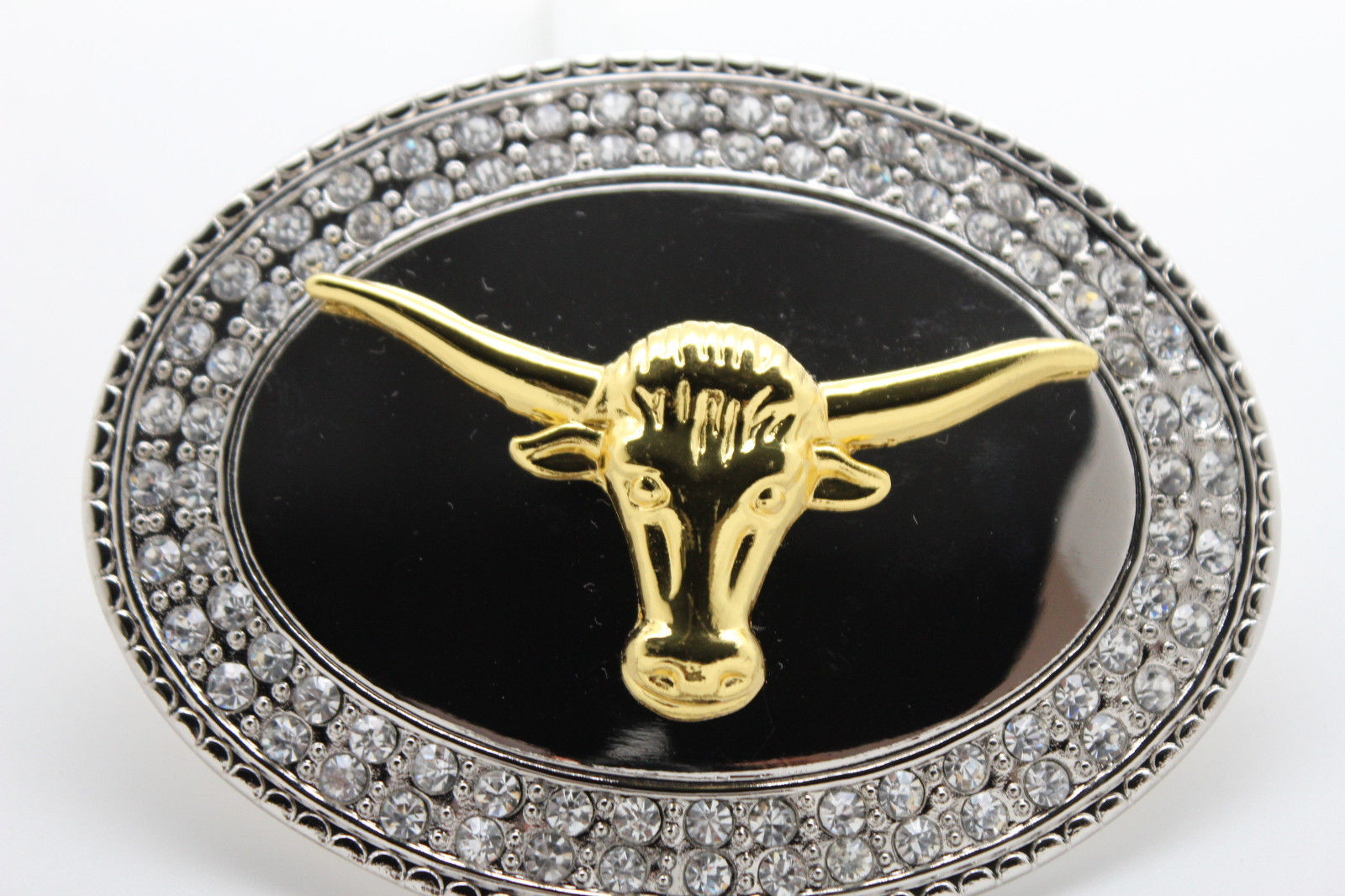
As the Bible tells us the Hebrews kept getting themselves "polluted" (from the Yahweh perspective) with Baal, Moloch and the other Canaanite deities like Ishtar. It is a very spiritually bipolar thing. It is a weakness of mine, too.
Enough of this Pazuzu or I'll end up twisting my head back to front and screaming obscenities as I do naughty things with a crucifix, lol.
Good to speak with you, OP.
Big time. A lot of what we do is unconscious.
We make body gestures specific to our psychological state. People use posture to demonstrate authority (think how the male in so many species will puff himself up, etc).
We humans are no different. I think it is more a reference to pride, elevation on an unconscious (and perhaps sometimes conscious) level.
The Baphomet does keep cropping up though. Bob Dylan has used it a lot as symbolism. I know he is a Mason. Does it reflect back to the Ram's Horns of the Hebrews in part? A lot of Jewish and Masonic related stuff seems to be associated with it. What is it my fellows find so intresting about Baphomet? The Crusaders of the 11th century saw it as a foreign enemy's deity. Yet they brought it home and it became tied up with secret societies and the occult ever after.

(Bob Dylan with his All Seeing Eye and Baphomet back drop)
Stanley Kubrick was born on July 26, 1928, in the Lying-In Hospital at 307 Second Avenue in Manhattan, New York City.[1] He was the first of two children of Jacob Leonard Kubrick (May 21, 1902 – October 19, 1985), known as Jack or Jacques, and his wife Sadie Gertrude Kubrick (née Perveler; October 28, 1903 – April 23, 1985), known as Gert, both of whom were Jewish.

Baphomet (Wikipedia)
The name Baphomet appeared in July 1098 in a letter by the crusader Anselm of Ribemont:
As the next day dawned, they called loudly upon Baphometh; and we prayed silently in our hearts to God, then we attacked and forced all of them outside the city walls.[6]
The Baphomet is no doubt Persian and probably as old as Pazuzu; it may even be a take on Pazuzu?
Or the crescent moon:

Remember SIN:

That's him in the middle of the bulls from ancient Babylon. Sin is the Moon god and the crescent Moon depicted like horns; that's one of the reasons why the bull and horns are venerated because of their resemblance (sympathy) with the crescent Moon. We even have the sacred cow to this day in India.
Sin started off in Assyria. Abraham came out of that culture. Even in Moses' time the Hebrews still had a great affection for Sin. Literally in The Wilderness of Sin they made the Golden Calf to worship. Remember Sinai comes from Sin. Our word for being naughty is "SIN". Sin was obviously still in vogue in Moses' time and beyond. Does Sin relate to Baphomet?
Every cowboy loves their bull horns:

As the Bible tells us the Hebrews kept getting themselves "polluted" (from the Yahweh perspective) with Baal, Moloch and the other Canaanite deities like Ishtar. It is a very spiritually bipolar thing. It is a weakness of mine, too.
Enough of this Pazuzu or I'll end up twisting my head back to front and screaming obscenities as I do naughty things with a crucifix, lol.
Good to speak with you, OP.
edit on 6-4-2017 by Revolution9 because: (no reason given)
a reply to: knowledgehunter0986
Not sure if you've seen this already but if you're a huge Kubrick fan you might want to check out this other thread I made about Eyes Wide Shut & Scientology.
Either way, you are welcome my good sir.
Huge Kubrick fan, flagged so I can read this later thanks for posting
Not sure if you've seen this already but if you're a huge Kubrick fan you might want to check out this other thread I made about Eyes Wide Shut & Scientology.
Either way, you are welcome my good sir.
Washington's Statue is an homage to the Roman General Cincinnatus who after defeating the enemies of Rome during the Republic returned to being a
private citizen. It is not related to any of the Emperors or Baphomet.
On a side note, my guests always get a kick when my music rotation I use for company spits out Al Bowlly's Midnight, the Stars and You.
On a side note, my guests always get a kick when my music rotation I use for company spits out Al Bowlly's Midnight, the Stars and You.
a reply to: AugustusMasonicus
I knew it was only a matter of time before you showed up to 'set things straight.'
Couldn't you let us have our little fantasy?
I knew it was only a matter of time before you showed up to 'set things straight.'
Couldn't you let us have our little fantasy?
originally posted by: AugustusMasonicus
Washington's Statue is an homage to the Roman General Cincinnatus who after defeating the enemies of Rome during the Republic returned to being a private citizen. It is not related to any of the Emperors or Baphomet.
On a side note, my guests always get a kick when my music rotation I use for company spits out Al Bowlly's Midnight, the Stars and You.
That is doublespeak. Why do you think the Roman General would be depicted in that posture? Was he just stretching his arms? Please also can you include a reference to or picture of the statue as this is just your word as it stands and quite frankly it doesn't stand that well. There is no picture I can find of the General posing like Washington doing the "Baphomet Shuffle", but there are heaps of ROMAN EMPERORS and some Kings of Demons that do it.
I challenge you to produce your evidence that Washington's depiction is just a reference to the General. I have seen the same articles online as you. I can't find one picture of your General in that posture. If he had ever dared assume that posture he would have been severely punished if not killed for acting up like Caesar.
edit on 6-4-2017 by Revolution9 because: (no reason given)
You are being very rude to me. I have contributed greatly to your thread. There is no fantasy in anything I have said as anyone will clearly be able to see; only conjecture.
originally posted by: ColdWisdom
a reply to: AugustusMasonicus
I knew it was only a matter of time before you showed up to 'set things straight.'
Couldn't you let us have our little fantasy?
Don't ever say "duh" to me again. It is incredibly rude to speak to a stranger like that. Did I ever abuse you like that. Man, I am trying to contribute. Don't treat me like that again.
Yes, I can see your hero worship of certain members. That's fine, but don't start using me as some tool to knock down to make someone you prefer look bigger (see what I mean about posturing and humans, dear reader, they can't help but do it quite unconsciously as well as consciously); Do you understand? I take human behavior to bits for breakfast.
new topics
-
Those Drones over NJ and elsewhere
Aliens and UFOs: 3 hours ago -
South Korean coup was an attempt to start WW3
World War Three: 4 hours ago -
Archer aviation and the NJ drones
Aircraft Projects: 4 hours ago
top topics
-
Only two Navy destroyers currently operational as fleet size hits record low
Military Projects: 15 hours ago, 12 flags -
Those Drones over NJ and elsewhere
Aliens and UFOs: 3 hours ago, 6 flags -
South Korean coup was an attempt to start WW3
World War Three: 4 hours ago, 5 flags -
Archer aviation and the NJ drones
Aircraft Projects: 4 hours ago, 4 flags
active topics
-
One out of every 20 Canadians Dies by Euthanasia
Medical Issues & Conspiracies • 26 • : Xtrozero -
Something better
Dissecting Disinformation • 27 • : chr0naut -
Could rampant land speculation have caused the Civil War?
History • 32 • : Solvedit -
They Know
Aliens and UFOs • 92 • : CarlLaFong -
Only two Navy destroyers currently operational as fleet size hits record low
Military Projects • 21 • : UpIsNowDown2 -
Stalker 2 - Review from a Veteran
Video Games • 3 • : gortex -
More Bad News for Labour and Rachel Reeves Stole Christmas from Working Families
Regional Politics • 6 • : covent -
-@TH3WH17ERABB17- -Q- ---TIME TO SHOW THE WORLD--- -Part- --44--
Dissecting Disinformation • 3700 • : CarlLaFong -
Those Drones over NJ and elsewhere
Aliens and UFOs • 7 • : xuenchen -
Post A Funny (T&C Friendly) Pic Part IV: The LOL awakens!
General Chit Chat • 7909 • : baddmove

